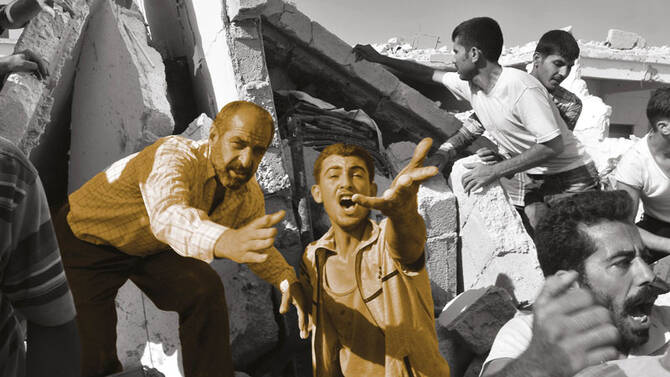DUBAI: On March 15, 2011, the tidal wave of the Arab Spring, which originated in Tunisia three months earlier, finally engulfed Syria.
The immediate trigger for the mass protests that broke out in Damascus and Aleppo was the arrest and torture of a group of teenagers who had scrawled the words “Your turn has come, doctor” in red paint on a wall in the southern city of Daraa.
The “doctor” was Bashar Assad, who became president of Syria in 2000, succeeding his father, Hafez, an army officer who had seized power in 1970. His “turn” was a reference to the toppling of presidential counterparts in Tunisia, Zine El-Abidine Ben Ali, and Egypt, Hosni Mubarak, in January and February respectively.
The graffiti was an expression of the growing anger among Syrians at a dynastic regime wreathed in corruption and bolstered by a ruthless security apparatus.
How we wrote it

Arab News highlighted the call from “Syria’s neighbors” to Assad, demanding he “stop the bloodshed” and protect civilians.
As the protests escalated, with “day of rage” demonstrations spreading to several cities, the regime reacted instinctively: with violence. On March 18, the army fired on protesters in Daraa, a city close to the border with Jordan, who were demanding the release of the teenagers who had painted the slogan on a wall of their school.
Four people were shot dead that day. Syria’s descent into civil war had begun.
At this point there was an opportunity for Assad to change course and, perhaps, spare his country the 11 years of bloody conflict that lay ahead. By the end of March, more protesters had been killed. But after Assad sacked his cabinet, and as he prepared to address parliament on March 30, his first public statement since the protests began, he was widely expected to offer some concessions.
Instead, he doubled down on repression. There would be no immediate reforms, no crackdown on corruption, and he ruled out the anticipated lifting of hated emergency laws, in place since 1963, that gave the security forces carte blanche to crush dissent in any way they saw fit.
Instead, to orchestrated applause, Assad accused “conspirators” and “outside forces,” including Israel, of stirring up trouble in Syria and causing the protests. There was no apology for the deaths of protesters.
Key Dates
-
1
Bashar Assad becomes president of Syria, succeeding his father, Hafez, an army officer who seized power in 1970.

-
2
After the presidents of Tunisia and Egypt are toppled during the Arab Spring uprisings, protests against the government break out in Syria. The regime responds with extreme violence.

-
3
Officers begin to defect from Assad’s forces and form the Free Syrian Army.

-
4
UN’s head of peacekeeping operations says fighting in Syria has escalated to the point of civil war.

-
5
Assad’s forces use chemical weapons in an attack on the opposition-held area of Ghouta, near Damascus. The Syrian Observatory for Human Rights says the death toll exceeds 500.

-
6
Russia intervenes in Syria, shifting the conflict in favor of Assad.

-
7
Following a swift offensive by HTS rebels, Damascus falls and Assad flees the country.

The protests escalated dramatically in the three months following the speech. Demonstrations took place in several cities, and tens of thousands of people took to the streets in coordinated protests across the country on July 1. Hundreds were killed or detained by the army.
Perhaps the single moment at which mass protests escalated to the point of civil war came on June 10, 2011, when an officer in the Syrian army released a video announcing his defection, along with 150 of his men. Giving his name, rank and position, Lt. Col. Hussein Harmoush urged other members of the regime’s military forces to follow suit.
“Our mission,” he said in the video, “is to protect unarmed protesters who are asking for freedom and democracy. We took an oath to stand in the face of our enemies, not our unarmed people.”

Harmoush would pay for the stand he took with his life. Along with members of his family, he sought sanctuary in a Turkish refugee camp shortly after defecting, but on Aug. 29 he was abducted and later paraded on Syrian television. He was never seen again and is thought to have been executed.
Nonetheless, other military leaders did indeed follow his example. On July 31, one of them, an air force officer, Col. Riad Asaad, announced the formation of the Free Syrian Army, which would become one of the most prominent Syrian opposition forces.
Assad had been president for 11 years when the civil war began. He would cling to power for another 11, bloody years, during which hundreds of thousands of Syrians were killed and half the population was displaced.

Syrian Zakia Abdullah sits on the rubble of her house in the Tariq al-Bab district of the northern city of Aleppo on February 23, 2013. AFP
Throughout it all — the regime’s shocking use of chemical weapons against its own people, the growing influence of extremist groups such as Al-Qaeda and Daesh, US-led coalition airstrikes, Russian military support for the regime, the sudden withdrawal of US troops from northeastern Syria, the sanctions-hit regime’s embrace of the drug Captagon as a source of revenue — it seemed that Assad would continue to weather the storm.
When the end finally came in December 2024, following a major opposition offensive led by Hayat Tahrir Al-Sham, a coalition of several armed groups that was formed in 2017, it was as sudden and unexpected as it was welcomed by millions of Syrians.
- Nadia Al Faour is a regional correspondent for Arab News. She previously contributed to international publications including The Guardian and USA Today.























